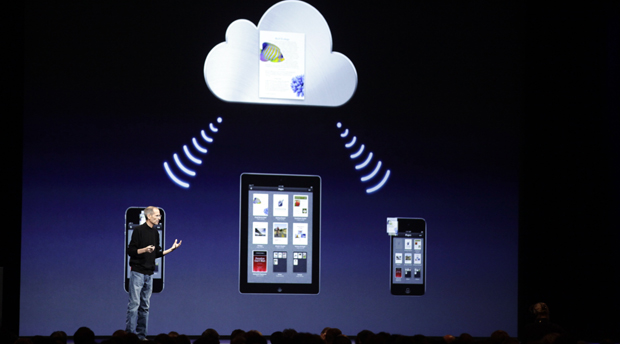Online piracy thrives in Internet cloud–study

In this June 6, 2014, file photo, Apple CEO Steve Jobs talks about iCloud at the Worldwide Developers Conference in San Francisco. Online piracy of music, films and other content has moved to the Internet cloud, reaping big profits for digital thieves, according to a study released Thursday, Sept. 18. AP
WASHINGTON–Online piracy of music, films and other content has moved to the Internet cloud, reaping big profits for digital thieves, according to a study released Thursday.
The study identified 30 cloud-based “cyberlockers” which operate globally and are hosted in various locations around the world, and which take in some $96 million in annual revenue.
These operators use the same kind of technology and often look like legitimate services like Dropbox and Amazon Cloud Drive to deliver illegally copied content, according to the study by the Digital Citizens Alliance and British-based NetNames, two groups focused on online safety and fraud protection.
The cyberlocker or cloud model has largely overtaken the older online piracy of peer-to-peer networks that allow individuals to share content on their own computers, but the result is the same.
“We’ve never had a business dependent on criminal activity grow and thrive in plain sight like the content theft industry,” said Digital Citizens Alliance executive director Tom Galvin.
“It’s astounding to think of 30 sites making $100 million on products they’ve stolen from content creators… cyberlockers wouldn’t thrive, perhaps not even survive, without legitimate businesses facilitating the rogue operators’ activities.”
The report released in Washington was described as “the first major assessment of how cyberlockers profit and how much money they make.”
The cyberlockers operate in a manner similar to legitimate services like Pandora or iTunes. Some offer free streaming content with advertising, and others allow direct downloads on a subscription model — such as $10 a month.
One of the best-known cyberlockers, Megaupload, was shut down by US law enforcement in 2012. But the New Zealand-based operator has launched a new service, known as Mega.
For some of the cyberlockers, tracing their home base is complicated because their locations are obscured by use of proxy servers. But the study said it identified cyberlocker operations based in the United States, Switzerland, the Netherlands and other countries.
The study said the most profitable cyberlockers using the direct download model were 4Shared, Mega and Uploaded. The biggest profits for the streaming operators were at Putlocker, YouWatch and Streamcloud.
The researchers found roughly 80 percent of the content on the sites had infringed copyrights.
Attacking payment system
The report said almost all the websites operating the cyberlockers accepted payments from Visa and Mastercard, and that these payment processors could deal a major setback to piracy if they would block the transactions. PayPal, according to the study, was accepted only on one of the sites.
“MasterCard and Visa should follow PayPal’s lead and adopt policies for their networks against doing business with these rogue operators,” the report said.
David Price of NetNames said that without the subscription payments, revenues and profit–particularly for the direct download cyberlockers–would drop off dramatically.
“Remove the payment processors from the equation and it becomes far more difficult for cyberlockers to profit from the work of others,” he said in a statement.
Because some of the sites appear legitimate, they draw advertising “from brands we know” that give the operators revenue and boost their credibility, the report said.
And many of the cyberlockers also contain malware that can infect computers of people who download from them, the report added.
“It’s going to take concerted action by the Internet and the payment processors, advertising industries, consumers, public interest groups, Internet safety organizations and responsible government officials to address this corrosive issue that threatens our basic trust in our online world,” the report said.–Rob Lever